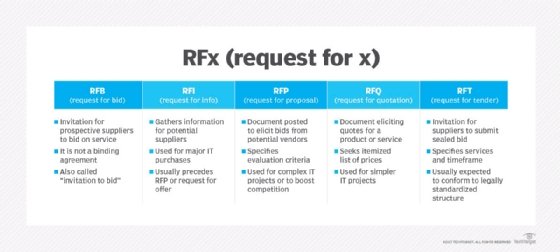Request for Offer (RFO)
What is a Request for Offer (RFO)?
A Request for Offer (RFO) is a document an organization issues to solicit bids or proposals from potential suppliers for goods or services. The RFO typically includes information such as the organization's needs, the scope of work and the evaluation criteria.
The RFO process is an important part of procurement management. Its aim is to obtain the best value for an organization's needs. This means considering not only the price of the goods or services, but also the quality, features and delivery time.

What are the steps involved in the RFO process?
The steps involved in an RFO process can vary based on the organization and the situation, but in general, it looks something like the following:
- Planning. The first step is to plan the RFO process. This includes identifying the organization's needs, and goals, and determining the evaluation criteria for those goals.
- Solicitation. The next step is to then solicit those bids or proposals from potential suppliers. This can be done through a variety of methods, such as publishing an RFO on a government website or sending it directly to potential suppliers.
- Evaluation. The third step is to evaluate the bids or proposals. This involves reviewing the information provided by each supplier and scoring them according to the evaluation criteria.
- Selection. The fourth step is to select the winning supplier. This is done by choosing the supplier that best meets the organization's needs.
- Contracting. The final step is to contract with the winning supplier. This involves negotiating the terms of the contract and signing it.
How to write an effective Request for Offer
Writing an effective RFO requires careful attention to certain key elements. First and foremost, clarity and conciseness are paramount. The RFO should be articulated in a manner that's easily understood by potential suppliers, eliminating any ambiguity that might hinder comprehension.
Specificity is key. It's crucial that the RFO contains a comprehensive amount of detail regarding the organization's requirements. This specificity helps potential suppliers to fully comprehend what is expected of them.
Fairness is also integral to the RFO process. The criteria for evaluation need to be objective and measurable, ensuring a level playing field for all potential suppliers.
Finally, timeliness is vital. The RFO should be issued with enough lead time for potential suppliers to prepare a thorough and thoughtful response. By adhering to these principles, organizations can draft effective RFOs that will ultimately help them secure the best return on investment.
Explore the pros and cons of a non-RFP versus an RFP procurement process and learn eight essential ERP vendor evaluation criteria.
